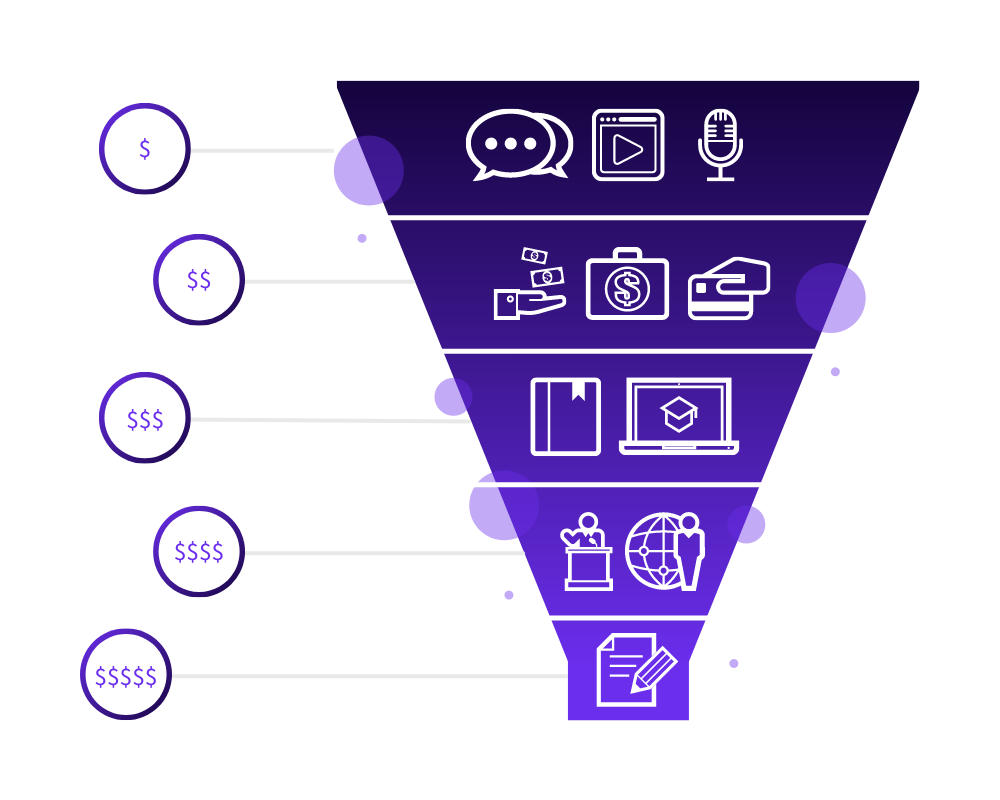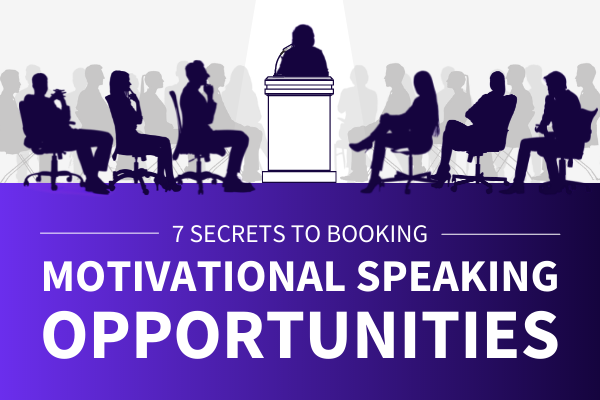It’s not enough to market yourself as a motivational speaker. If all it took was to brand yourself as a thought leader and share your thoughts on social media, everyone would do it. In reality, you have to know how to leverage your expertise and connections if you want the best secrets to booking motivational speaking opportunities.
Though it might be disappointing to hear, there’s no magical get-rich-quick formula. Motivational speaking opportunities do exist, but they’re rarely a highway to overwhelming success overnight. If you’re willing to put in the long-term work to make your speaking business a success, then you’re in the right place.
While everyone has to follow his or her own path to the right opportunities, there are 7 secrets to booking these gigs that you probably don’t know. Luckily, you don’t have to figure things out on your own. Using our years of experience working with professionals in the speaking space, we’ve compiled our top secrets for booking motivational speaking opportunities.
No matter where you’re at in your business journey, you can start landing more gigs. If you understand your audience, your goals, and how to build a strong presence around your brand, you become unstoppable. In a perfect world, you won’t have to seek out motivational speaking opportunities. They’ll come to you. Ready to begin? Let’s dive into it.
- Niches really do lead to riches.
- You might have to start small to succeed.
- Greater visibility adds to your credibility.
- Sales skills are necessary, even if you hate sales.
- Personalized, consistent communication is key.
- The best speakers actively upsell and generate referrals.
- Every speaking opportunity starts with value.
Niches really do lead to riches.
First, you need to start with the basics if you want to build a strong foundation. No matter what type of business you’ve done in the past, you’ve probably heard the phrase “niches lead to riches.” It’s true this phrase is more than a little bit worn out, but the meaning rings clear. The more focused you are on a single industry or group, the easier it is to tailor your content to them.

The honest truth is you’re not going to be the right motivational speaker for everyone. You won’t be everyone’s cup of tea, and your experience doesn’t apply to every single person. If it did, it probably wouldn’t be very meaningful or actionable. If your goal is booking motivational speaking opportunities, you need to know exactly who you’re trying to reach.
This means you need to know your ideal audience inside and out. When you know who they are, you understand where they spend their time, the questions they have, and their pain points. This prepares you to market yourself specifically with their needs in mind. Consider your own journey to motivational speaking. What experiences can you draw from? What audience are you prepared to help? The right niche isn’t forced. Instead, it comes naturally.
How To Find Your Niche:
- Write down the clear demographics of your ideal audience. This includes gender, age, geographic location, personal or professional concerns, etc. Make note of additional characteristics you want to keep in mind, too, such as time spent working in their industry or level of education.
- Pinpoint where you can find audience members that meet the above criteria. Are they most often found in a certain industry? Geographic location? Type of organization (associations, for example)?
- Research your chosen niche to understand their needs. What challenges are they facing? How has their niche evolved in recent years? How can your expertise serve them and help them succeed, despite these changes?
You might have to start small to succeed.
Second, don’t expect to be on top of the world overnight. While it’s true some people go viral on social media and find themselves on the TED stage right away, this is an exception to the norm. You’re not likely going to catapult to stardom, so don’t get disappointed if you start small. As the saying goes, slow and steady wins the race. Though there’s often an illusion of glamor and prestige around speaking, the reality isn’t always this exciting. To be blunt, it can be quite mundane and slow-paced.

The vast majority of successful speakers aren’t those who stumbled into success overnight Rather, they began speaking locally or for free to gain experience within their target market. Then, they worked their way up from there. Oftentimes, the hardest step is just getting started. Remember, you don’t need a crazy backstory or some life-changing moment to get started. Everyone has something worth saying. Successful speakers come from everywhere.
What do we mean when we say you should start small? In the digital age, there are so many platforms to put yourself out there. Things like industry panels, webcasts, or even podcast guesting can help you build your resume while getting you comfortable in front of your audience. This allows you to refine your message so you’re ready to take on the bigger stage later on.
How To Start Small:
- Research local and virtual events within your niche. Think of them like job applications, and remember, even if you don’t necessarily think you’re qualified, you can help the audience. Apply with confidence and passion – I promise you’ll book more gigs than you expect if you’re passionate, well-organized, and easy to work with through the application process.
- Partner with influencers, thought leaders, and others in your network to expand your audience. These can be long-term relationships, so remember the lifetime value of a partnership as you reach out to collaborate.
- Don’t compare yourself to others – No two speaker’s journeys are alike. This isn’t to say you can’t learn from other speakers, but remember to be patient.
Greater visibility adds to your credibility.
Next, it’s never been more important to have a strong presence online. With only 30% of marketers today saying their content strategy is working, this is an opportunity to stand out. Event organizers want to hire motivational speakers who are visible, relevant, and accessible both online and offline.

What does this mean in practice? It means having a solid website, being active on social media, and using the right online channels to build a community. It’s more than just posting on your website or sharing links on Twitter. You need to provide real-world value, showing that you’re an expert in your space. If nobody can find you, how can you expect them to book you? Even if you have a small presence, you need enough visibility to build trust.
The greater visibility you have online, the more legit you seem to event managers. When people find you organically online, they’re more likely to think of you when they’re booking events. You can’t underestimate the power of a strong network—both online and offline. Speaking is a people business. Even in the digital age, you need to build your own community.
How To Build Your Online Presence:
- Target SEO-optimized keywords for your niche. This should be done in every digital facet of your business including blog posts, podcast episodes, video descriptions, lead magnets, and pages on your website. In short, if it’s online, it’s worth SEO opitmizing.
- Create a content strategy for posting on social media. Even if you don’t have time to post daily, regular posts and engagement show your followers that you’re active and approachable. Plus, every post is a chance for you to demonstrate your extensive expertise.
- Don’t just post your own content. Engage with others in your niche, too. This goes back to making partnerships. But, long story short, you’ll get further if you show your support for your niche as a whole, not just your own business.
Sales skills are necessary, even if you hate sales.
Additionally, don’t underestimate the power of sales skills. It doesn’t matter if you love sales or the thought of selling yourself makes your skin crawl, it’s a necessary part of speaking. While it’s true many speakers hire someone to sell on their behalf, you have to know how to sell yourself either way. Unfortunately, there are no shortcuts when it comes to sales.

As a motivational speaker, you’re largely selling yourself and your confidence. As we shared earlier, this is a business based on people and relationships. Motivational speaking opportunities won’t materialize unless you learn how to sell yourself effectively. Look at it this way: even if you hire a salesperson, you’ll still need to train them.
The good news is anyone can learn sales skills, no matter your experience level. Forget everything you think you know about sales—the slimy tactics, the endless phone calls, etc. Instead, focus on helping others. You know you’re a great motivational speaker, and your goal is to be an active listener and be persistent about your value. When you focus on how you can help others, sales come naturally.
How To Grow Your Sales Skills:
- Create strong sales materials and keep them easily accessible. These include resources such as a speaker biography, speaker introduction, descriptions of your programs, and a speaker kit that combines these resources into one packet. Each sales resource should be designed to match your personal brand. It should also be easy to share with event organizers at a moment’s notice.
- Practice your sales pitch with someone you trust, and be open to feedback. We recommend asking other speakers in your network, friends, and family. The more feedback you can get, the better.
- Practice makes perfect! Sometimes you just have to put yourself out there, so practice often and continually iterate on your presentation.
Personalized, consistent communication is key.
Speaking of sales, you also need to leverage personalized communication. Your sales outreach and proposals aren’t one-size-fits-all. When you prioritize attention to detail, it always works in your favor. Your clients want to feel special. They recognize when you send copy-pasted sales proposals and messaging. If you want success booking motivational speaking opportunities, you need to know how to be genuine vs. self-promotional.

With 72% of consumers only engaging with brands and professionals that provide personalized content, now is the time to do your homework. The more you understand your prospective clients and their needs, the easier it is to make them feel special. It’s not enough to focus on why this opportunity is great for you. Your clients want to know why it’s a great fit for them.
Real-world personalized selling and communication mean more than adding your client’s name to the introduction line. It’s really about customizing the sales funnel, adjusting your proposals, and offering high-value packages with your customer in mind. Most importantly, personalized, consistent content pushes you ahead of the competition.
How To Personalize Your Communication:
- Before you start selling to an event organizer, do your research. Understand what they do, their goals, and why you’re the perfect fit for their event. Additionally, research the organization hosting it. Are their any additional ways you can provide value after the event is over (consulting, executive coaching, etc.)?
- Customize your communication to suit each client’s individual needs. For example, if an event organizer prefers to communicate via email rather than phone, stick to email. The more courteous and communicative you are, the more likely you are to book the gig.
- Even after you’ve landed the sale, continue to focus on a personalized experience. Pre-, mid-, and post-event, you should be easy to reach, calm and collected, and consistently professional.
The best speakers actively upsell and generate referrals.
Next, your best clients are current clients (and past clients). While new speakers might always focus on the next thing, don’t forget about what’s right in front of you. You can always move existing clients into new speaking opportunities when appropriate. For instance, after your first motivational speaking gig, ask for a referral or continue to pitch to them in the future.

Repeat and ongoing business are significantly easier than constantly chasing new leads. Better yet, it helps you leverage existing relationships, creating long-term opportunities. Sure, a one-off gig is great, but booking motivational speaking opportunities again and again is the real path to a sustainable career.
Aside from improving your speaking skills, you can also upsell other aspects of your business. Most speakers offer many services, like consulting, workshops, and more. You could offer to attend a conference or event for multiple sessions, share copies of your book, or package your offer with other services. Not only does this have higher earning potential, but it also is more likely to generate referrals.
How To Encourage Referrals:
- Always develop existing skills and offerings. Remember, even though you may be looking for motivational speaking opportunities, you’re an expert first and a speaker second. What other products/services can you offer (besides speaking) to past or current clients to share that expertise?
- Provide a high-quality, service-driven experience from start to finish, encouraging clients to work with you in the future. Again, the better the experience for the event organizer, the better your chance of getting asked back. Keep in mind, too, that many event organizers work with more than one organization to book events. So, long-term, your relationship with an organizer can pay off many times over.
- Always follow up with clients after gigs, asking for reviews, referrals, or other opportunities.
Every speaking opportunity starts with value.
Lastly, the biggest secret of booking motivational speaking opportunities is to leverage your value. As all professional speakers know, value comes in all shapes and sizes. Yes, your speech itself is a type of value, but it doesn’t end here. You can provide value through free content, consultations, testimonials, and so much more.

If you want to be booked for a motivational speaking event, you have to have a service before sales mindset. Focus on the potential client, their audience, and their needs. When you establish your value, you can charge a higher rate, secure long-term engagements, and refer more new clients. When you have successful work behind you, your value speaks for itself.
As you grow your skills, learn how to demonstrate your experience, stage presence, and expertise. You’re a thought leader in your chosen field, and you have a message worth sharing. Clients want to work with you because you know what you’re doing. Most importantly, you know how to communicate your value from both a practical and sales standpoint.
How To Identify Your Value:
- Ask event organizers and audience members for feedback at the end of each event. What made it impactful for them? What could you have done better? If you were to add varying forms of engagement (a post-event Q&A session, for example, or mid-presentation live audience polls), would that add value? In response to each of these questions, iterate and adjust so you’re always improving.
- Share testimonials and social proof to advocate for your value. These should appear on your social media profiles, your website, and sprinkled throughout your sales materials.
- Always be open to learning and growing your skills. Even the most renowned motivational speakers have ways they can improve. Remember that, and stay vigilant about ways you can book more gigs more quickly in the future.
Being a great speaker is only the first step. Unfortunately, that’s not enough on its own for prospective clients to instantly realize how valuable you are. Instead, you need to know how to sell yourself and your experience. This is the true secret to booking motivational speaking opportunities.
The best speaker leads with value, confidence, and genuine compassion. The more you grow your skills as a motivational speaker, the less it feels like selling yourself. Rather, you’ll naturally attract the perfect client through your content, sales expertise, and marketing. Let your talent speak for itself – the rest will follow.






